Before diving deep into the process of content creation for social media, let’s have a look at the things that make social media marketing different from other forms of digital marketing.
Social media is one of the greatest tools for reaching your followers directly and branding online. There is no gatekeeper to the content you’re putting out there or the story that you’re telling about your brand. So, social media allows you to shape the way people feel about your product or service, the way your community acts, and what you want them to do with your product or service.
When you lack content ideas for social media, remember that the most crucial thing is to have a conversation with your followers. People want to know about you and your expertise and they want to feel like there’s a human behind the content they’re consuming.
It’s also important to keep in mind that the more systemized your content distribution is, the more engagement, reach, and impact you can have.
Conversational copywriting is the key to social media. It’s vital to make every follower feel like every single status update was written just for them. So, when you start creating content for social media, the golden rule is sitting down and feeling like you’re talking to one person or texting a friend.
Another thing you need to focus on is the feelings you want to give your followers when they read your content and for every brand, these feelings are different. For example, Meet Edgar likes to come across as a very inspirational brand, sometimes a bit cheeky and jokey and sarcastic, but always positioning itself as the go-to brand for social media, knowledge, and inspiration in your niche.
So, think about what you want your brand to be recognized for and make sure every single status update shows your brand voice and consistency.
Now, let’s dive into the 5 steps to success on social media.
Step 1. It all starts with categories
To tweak your content creation strategy for success, you first need to categorize your social media content. However, the categories of content are different for every brand depending on its products, voice, goals, values, etc. In the video [4:59], Megan takes a close look at some categories that perform well on social media.
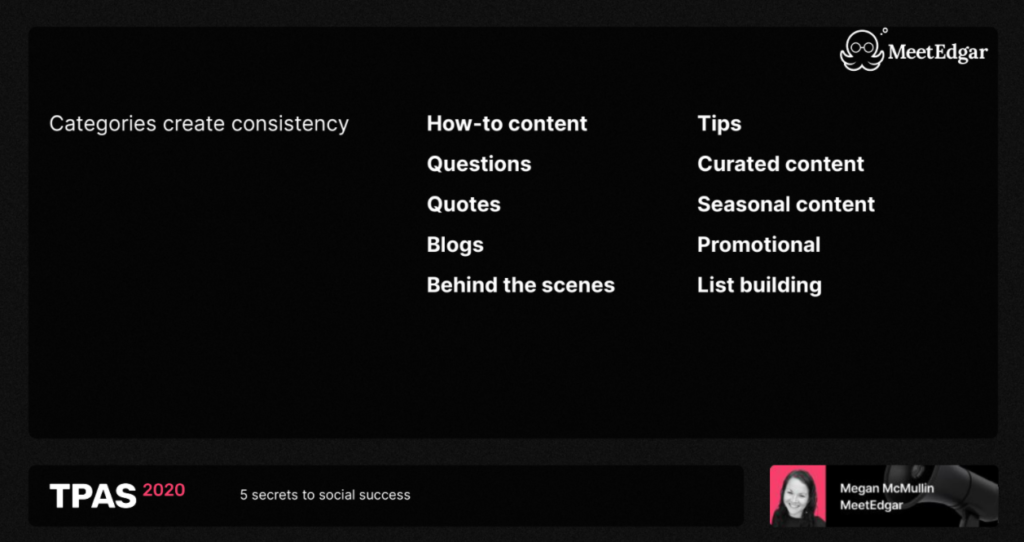
Why is it important to rotate through different types of content? First, it guarantees that your social media feed doesn’t become a place where you’re just shouting promotions at people all the time. Most people don’t want to be sold to when they’re just relaxing on social media. So, for your sales posts to hit well, it’s crucial to build a rapport with your followers, educate, and entertain them with valuable posts.
Second, people prefer doing business with people or brands they know, love, and trust, especially on social media. In her talk [6:40], Megan explains why it’s vital to lay the groundwork of building a relationship to ensure that people like you more than your competitors, and trust you.
How-to content
When creating how-to content, make sure you identify the challenges and pain points of your audience and create content to help them tackle these. If your followers see some tangible results from your “how-to” tips, they are more likely to purchase your product or service when you sell to them.
Questions
Boost engagement with questions. These can be some simple or funny icebreaker questions like If you were a condiment on a hamburger, which one would you be? Though such questions have nothing to do with your brand, people get used to talking in your posts. That way, when a really great question about your brand might come up, people are more likely to stop and engage with it.
Quotes
Social media is the go-to place for inspiration for many people. That’s why quotes are a really powerful content category to build brand awareness and relationships with your followers. Besides, quotes are easy-to-make and you can use a social media automation tool like MeetEdgar to post them hassle-free.
Blogs
Make sure you use social media to direct people to your website or a blog. Remember that social media isn’t the place to build a business as you don’t own the platform and all your business efforts can go waste if it changes its algorithms or just disappears. So, social media needs to be just a hub that you’re distributing your content for people to engage with.
Behind the scenes content
In the video [12:31], Megan explains why it’s important to share some behind the scenes info about your brand on social media. Sharing your origin story and your brand’s values help create a close bond with your followers and yield better business results.
Tips
Tips are great for repurposing content. You can share some actionable tips in your blog, videos, podcasts, or put them as text-only tips.
Curated content
Though many digital marketers are skeptical about it, there’s nothing wrong with sharing other people’s content with your audience. Keep in mind that to be a really good expert, you don’t need to know everything. So, make sure you discover what subjects your followers want to be educated on and find top-quality relevant posts to share.
Seasonal content
Share content that’s built around a specific season, major holiday, or an upcoming event. This type of content resonates with what’s going on in people’s lives and boosts visibility and engagement.
Promotional content
Go ahead and talk about your product or service moving your followers down the sales funnel.
List building content
Social media is not the place to hard sell and the content shared there should mostly provide value to your followers. That’s why it’s essential to create top-notch lead magnets to get people to sign up for your newsletter. Then, you can start to sell in your emails much better than you can on social media.
Step 2. Batching
Batching your social media content is another thing you need to do to save tons of time, create a consistent brand voice, and get into a really good flow state of working. What exactly is batching?
In a nutshell, batching is the process of grouping like tasks together and writing them in one sitting. It allows you to stop wasting time on multitasking and switching from task to task. Also, it saves you the ordeal of churning out content daily, helps you avoid burnout, and frees time for some other tasks.
In the video [15:24], Megan gives an example of how batching can save you loads of time on creating social media updates and helps establish an easy-to-recognize brand voice and a consistent presence on social media.
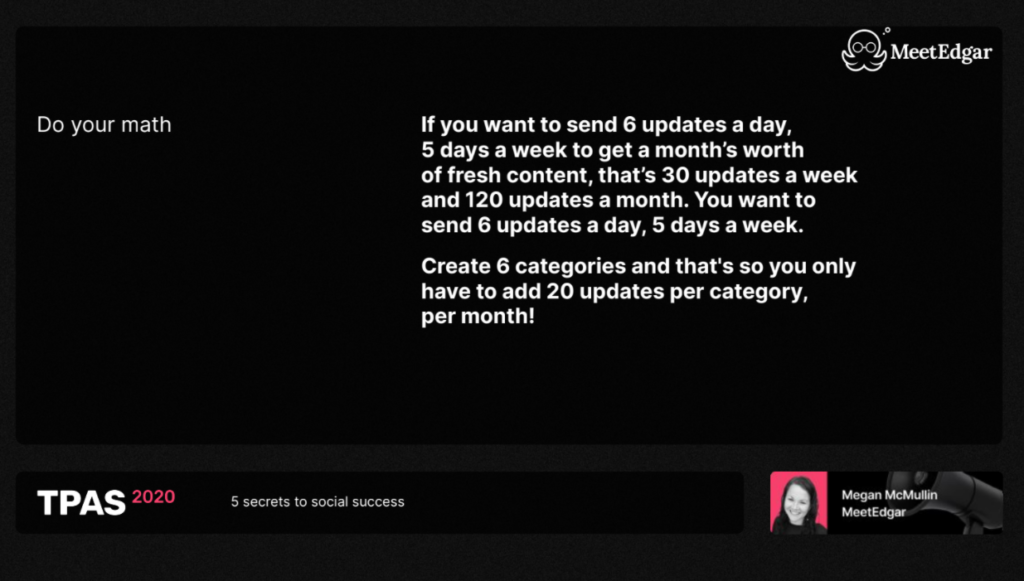
Step 3. Set a distribution schedule
Once you’ve created top-notch content, it’s time to make sure it gets out in the world. When setting a distribution schedule, remember that your content should be 80% valuable and only 20% promotional.
This means that you need to identify the main challenges and pain points of your audience and show how your product or service can help them solve these pain points and achieve their dreams. It’s also vital to explain what benefits your followers will get from using your product or service and provide social proof.
Another thing you should keep in mind when creating social media content is touchpoints with a brand. Every time a person sees your brand is one touchpoint and, on average, it takes about 14 touchpoints to remember and become loyal to a brand. That’s why it’s important to make sure that the majority of these touchpoints provide value to your followers.
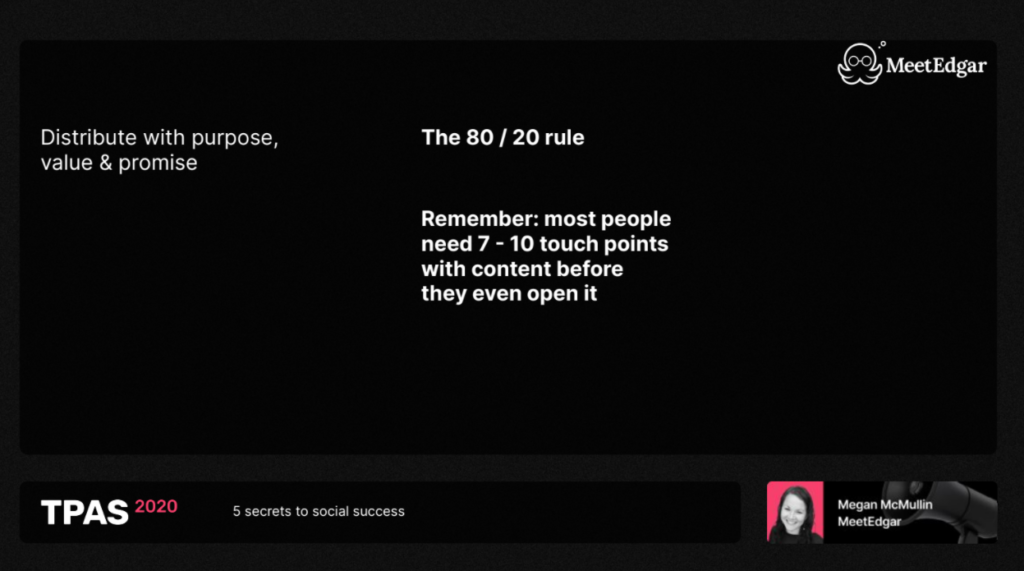
The next content creation hack Megan shares in her talk [23:23] is to schedule an engagement-oriented post before a promotional post. For example, you can ask a question or put something funny that is likely to strike a chord with your audience.
It’s vital to boost your engagement before you start promoting as increased engagement levels guarantee that more people will see your posts on their feed.
Create smarter content
It’s also important to work smarter, not harder on social media. Here’re some content marketing tips to help you reap better results with less effort invested.
- Create evergreen content
Evergreen content is content that doesn’t have an expiration date and is sure to resonate with your followers for a long period of time. With evergreen content, you can create a piece of content once and promote it multiple times to save a lot of time, nurture followers, and move them down the marketing funnel. - Share on a schedule and rotate through your categories
- Stick to the one-CTA-per-piece-of-content rule. Make sure that each piece of content has one job to do and it is clear for your followers what action they need to take.
- Ask questions related to the content you’re sharing and communicate with your followers in the comments. This resembles one-on-one communication and helps boost engagement. In the video [28:30], Megan uses an example of MeetEdgar to illustrate how questions can be used to get more comments and drive engagement.
All these content hacks can free up time for engaging with people and doing things like polls, stories, asking people questions in your stories, and directly answering them.
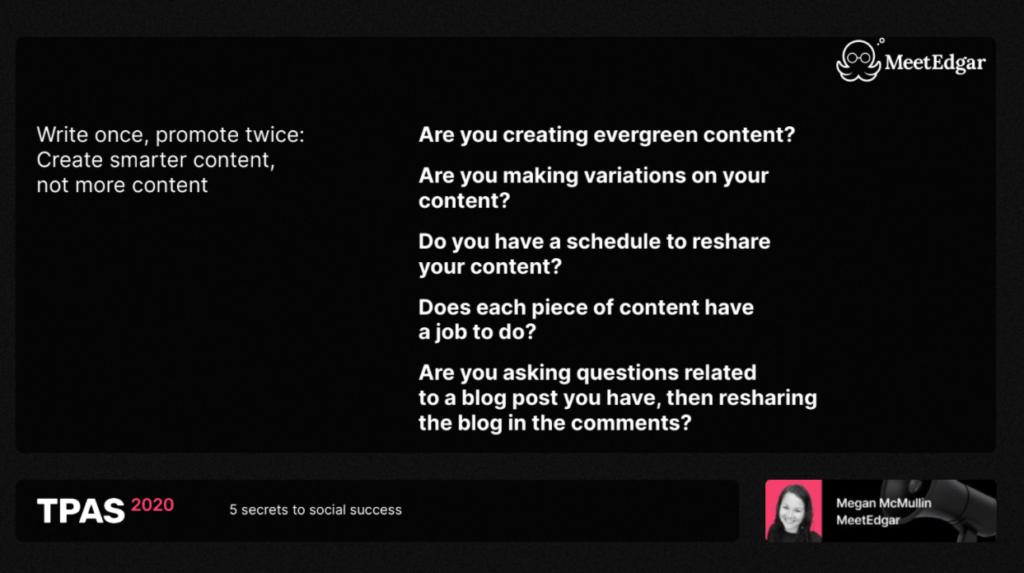
Step 4. Upcycle your content
Content upcycling means you should take one piece of content and make multiple status updates out of it. It saves you the trouble of reinventing the wheel every time. Don’t be afraid to repeat information and disappoint or bore your followers. By contrast, repeating your ideas helps you establish yourself as a niche expert.
Here’re some ways to repurpose your top-notch content:
- Turn it into a podcast to add more personality and reach out to people who prefer audio content
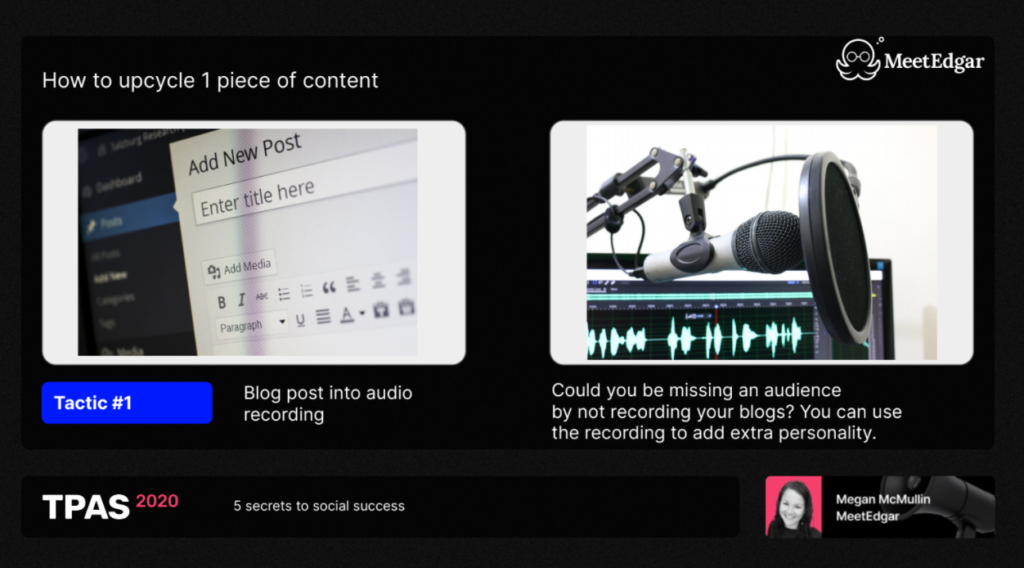
- Put part of your content into a newsletter
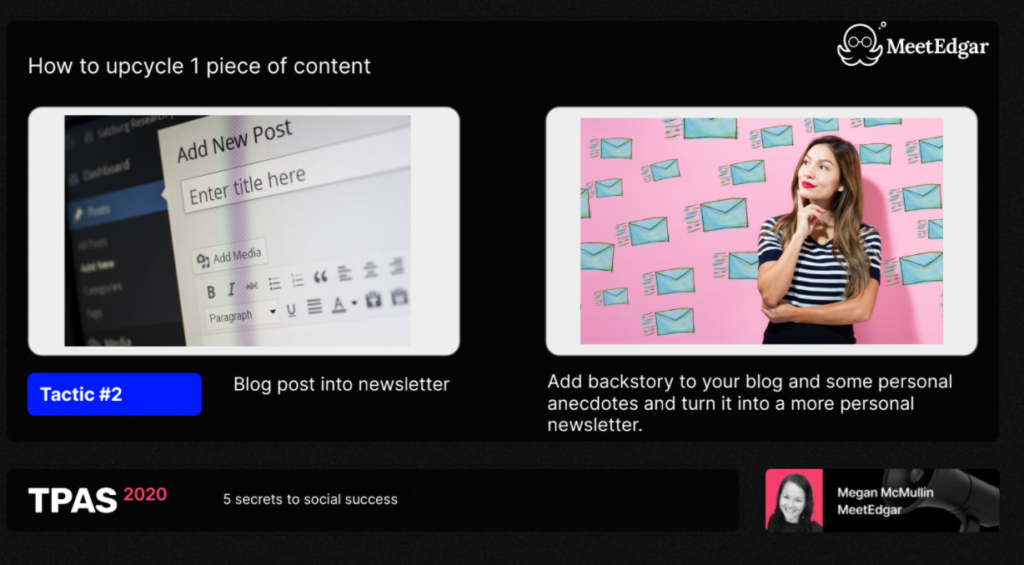
- Use some part of your content to create a shareable quote card
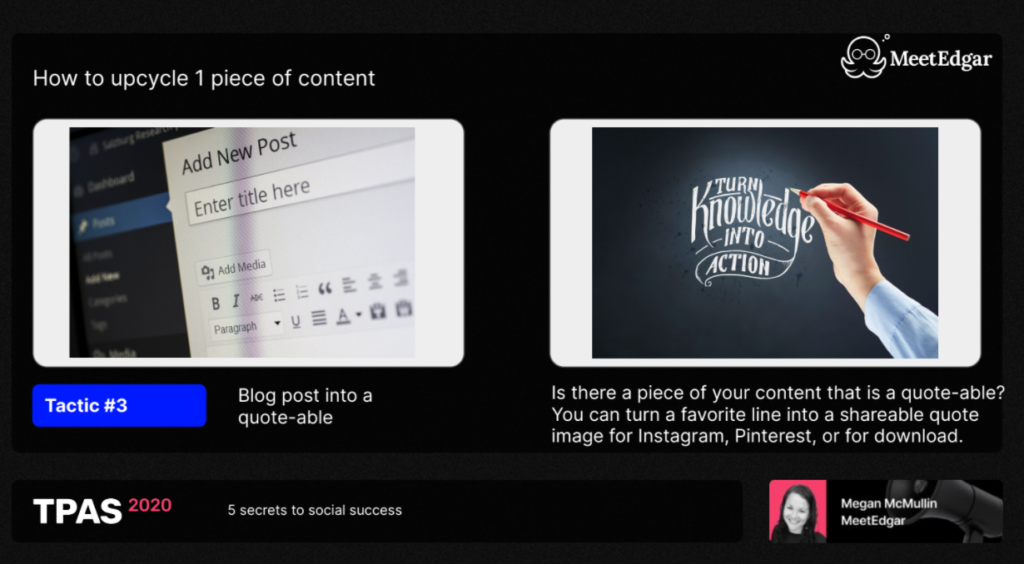
- Make a PDF to build up your email list
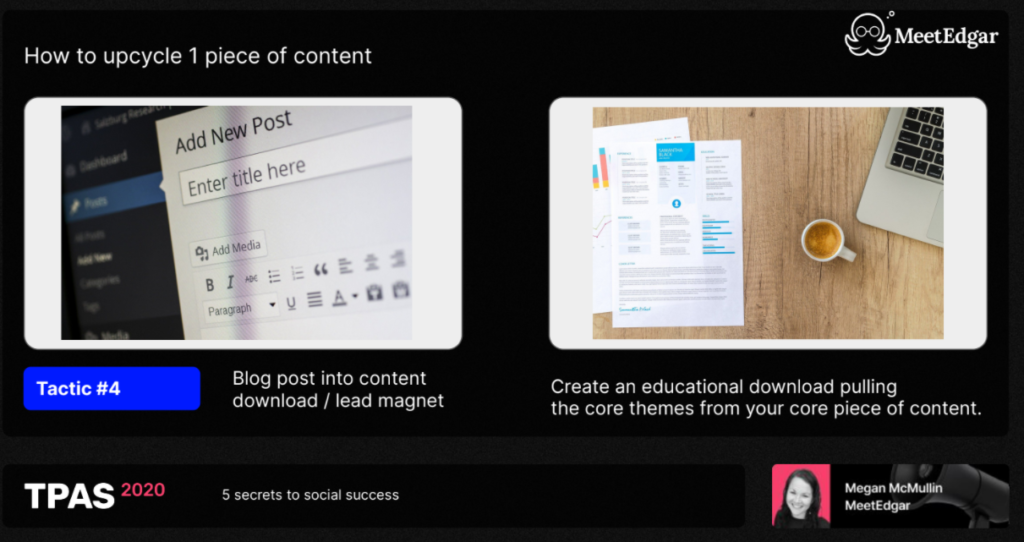
- Create a short video focusing on the key takeaways from your content
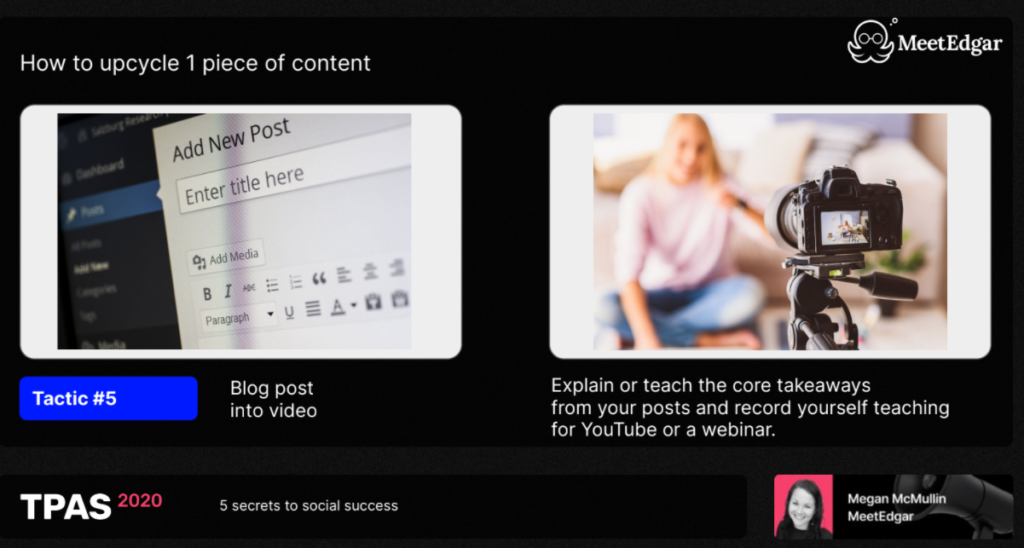
Step 5. Engage with your followers
The last and most crucial step is engaging with your followers which can be pretty time-consuming. So, batch your engagement the way you batch content creation and leave 10-15 minutes at the end of the day to have a conversation with people who commented on your posts.
If you’re still building up your following and there’s little engagement, use that batching time to DM your followers, offer value in relevant Facebook or LinkedIn groups, etc. This will help you establish yourself as a niche authority and people will start seeing you as a really helpful person on social media.
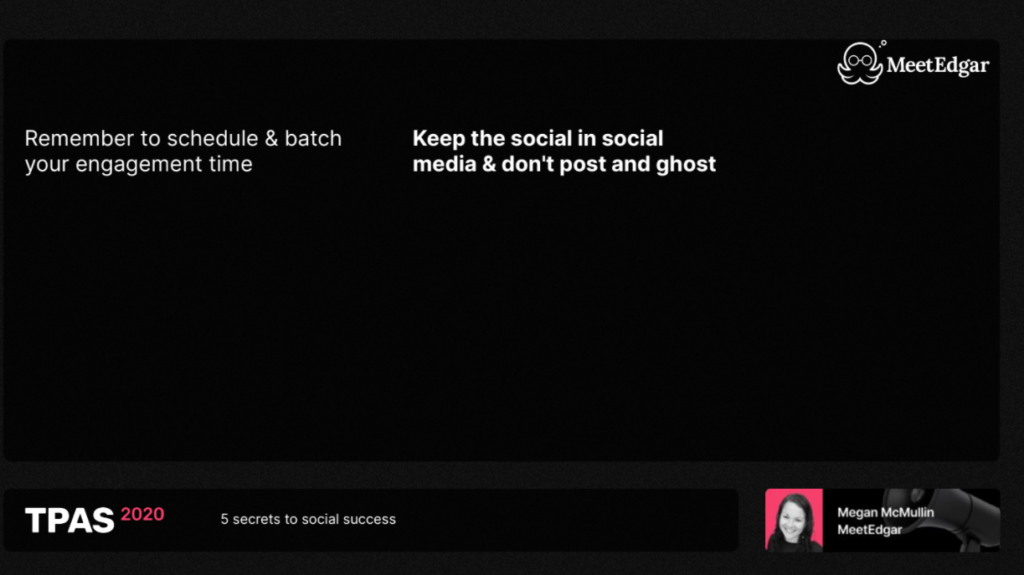
Bottom line
To round the talk off, Megan points out [37:58] that though the steps to social media success are pretty simple, they require a lot of time and effort invested. So, to make the task easier, it is vital to approach your social media performance in a systemized way which means posting consistently, having a thought-out intent behind your posts, and getting a conversation with your followers going.
Presentation
You can download the presentation from the webinar at this link.



